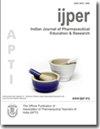北塞浦路斯药剂师、患者和肺科医生对治疗呼吸道疾病的草药产品的态度、知识和评价
IF 0.8
4区 医学
Q3 EDUCATION, SCIENTIFIC DISCIPLINES
Indian Journal of Pharmaceutical Education and Research
Pub Date : 2023-10-04
DOI:10.5530/ijper.57.4.148
引用次数: 0
摘要
摘要:背景:近年来,随着人们寻求替代传统医学的治疗方法来管理各种健康状况,补充和替代医学(CAM)的应用显著增长。目的:本研究旨在评估草药治疗呼吸系统疾病的使用情况,加强草药产品的安全和有效使用,并提高对北塞浦路斯呼吸道疾病中CAM有效性的认识。材料与方法:对自愿参与调查的610名呼吸内科患者、10名肺科医生、150名药剂师进行调查。数据是通过三份量身定制的问卷收集的,这些问卷分别面对面和在线分发给目标参与者。收集的数据采用SPSS软件进行分析。结果:调查数据显示,收入和文化程度较低的患者使用中草药的频率低于收入和文化程度较高的患者(p= 0.026)和文化程度较高的患者(p= 0.003)。45岁以下药师对中药材的了解程度高于45岁以上药师(p<0.05)。据观察,绝大多数(96%)药剂师向患者推荐草药产品,主要用于预防目的。此外,肺科医生缺乏草药成分、药理、给药、适应症、副作用和使用警告的知识。结论:该研究强调了药剂师、患者和肺科医生在使用草药产品治疗呼吸系统疾病方面缺乏足够的信息。迫切需要举办研讨会和提供可靠的资源来解决这一知识短缺问题。关键词:补充与替代医学,药师,草药产品,呼吸系统疾病本文章由计算机程序翻译,如有差异,请以英文原文为准。
The Attitude, Knowledge, and Evaluation of Herbal Medicinal Products for Respiratory Diseases in Northern Cyprus among Pharmacists, Patients, and Pulmonologists
Abstract: Background: The utilization of Complementary and Alternative Medicine (CAM) has grown remarkably over the years as people seek alternative treatment methods to conventional medicine to manage various health conditions. Aim: The study aimed to assess the utilization of herbal remedies in treating respiratory disorders, enhance the safe and efficient use of herbal medicinal products, and raise awareness of the effectiveness of CAM in respiratory tract diseases in Northern Cyprus. Materials and Methods: The study was conducted on 610 respiratory patients, 10 pulmonologists, and 150 pharmacists, who participated voluntarily in the survey. The data was collected through three tailored questionnaires distributed to the target participants face-to-face and online. The collected data were analyzed using the SPSS software. Results: The data obtained from the survey indicated that patients with lower income and educational attainment tend to use herbal medicinal products less frequently compared to those with higher income (p= 0.026) and educational levels (p= 0.003). Pharmacists aged under 45 were more knowledgeable about herbal medicinal products than pharmacists over 45 (p<0.05). It was observed that a substantial majority (96%) of pharmacists recommend herbal medicinal products to their patients, primarily for preventive purposes. Additionally, pulmonologists lacked knowledge of herbal medicinal compositions, posology, administration, indications, side effects, and usage warnings. Conclusion: The study highlights the lack of adequate information among pharmacists, patients and pulmonologists regarding using herbal medicinal products for respiratory diseases. There is a pressing need for seminars and credible resources to address this knowledge deficit. Keywords: Complementary and Alternative Medicine, Pharmacists, Herbal Medicinal Products, Respiratory Diseases.
求助全文
通过发布文献求助,成功后即可免费获取论文全文。
去求助
来源期刊
CiteScore
1.40
自引率
0.00%
发文量
227
审稿时长
>12 weeks
期刊介绍:
The official journal of Association of Pharmaceutical Teachers of India (APTI) and is being published since 1967. IJPER, a quarterly publication devoted to publish reviews and research articles in pharmacy and the related disciplines of Pharmaceutical education. It mainly covers the articles of special interest, covering the areas of Pharmaceutical research, teaching and learning, laboratory innovations, education technology, curriculum design, examination reforms, training and other related issues. It encourages debates and discussions on the issues of vital importance to Pharmaceutical education and research. The goal of the journal is to provide the quality publications and publish most important research and review articles in the field of drug development and pharmaceutical education. It is circulated and referred by more than 6000 teachers, 40,000 students and over 1000 professionals working in Pharmaceutical industries, Regulatory departments, hospitals etc.

 求助内容:
求助内容: 应助结果提醒方式:
应助结果提醒方式:


